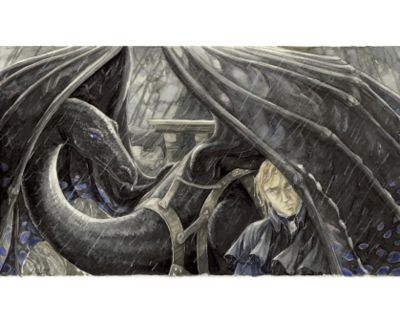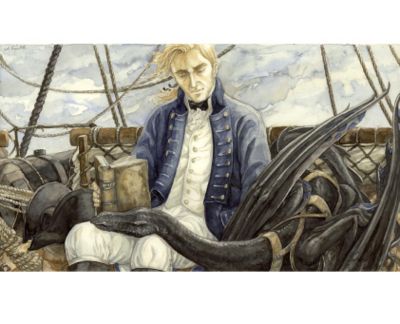Dragon Relationships with Captains
In most circumstances, a dragon's captain was the human who harnessed the dragonet at birth. The dragonet permitted the human to do so, and to give the dragonet a name.
In the Aerial Corps, dragons had enormously close relationships with their captains, generally ones of mutual affection and respect. However, this was not always the case. Capt. Jeremy Rankin was neglectful of Levitas to the point of abuse, but could not be removed from his post because Levitas continued to obey his orders and to crave Rankin's love and approval. Other dragons were less tolerant. Majestatis purposefully "mislaid" his captain and chose to live in the breeding grounds instead.
The partnership between dragon and captain could also be ended by the captain. Perscitia's captain gave her up after she made it clear she would not fight.
In most cases, however, the relationship with the dragon generally became the most important one in the captain's life, making it very difficult to live a "normal life" during the captain's off-duty time. This led to aviators' development of a culture largely apart from society, and not well-respected by it, despite the extraordinary sacrifices they made for their service.
Dragons tended to be both protective towards and possessive of their captains. A dragon could be removed from battle by the capture of their captain, as the dragon would surrender to prevent the captain being killed. The possessive attitude of dragons towards their captains in some ways bordered on their attitude towards property. For example, when Minnow snatched the captain off the back of a Defendeur-Brave during the Battle of Shoeburyness, Temeraire interpreted this as "stealing" and made a mental note to keep her away from Laurence, even though Temeraire had already knew that Minnow had no interest in being put in harness.
Inherited dragons
Many larger dragon breeds had long lifespans, and the dangers of battle aside, they were likely to outlive their captain. Dragons found this fact painful and difficult to accept.
Aviators often had children with the intent the child would enter the Corps and provide a new captain for their dragon upon their own death or retirement. It was thought that having a new captain who had some connection with the former one would make the transition easier for the dragon. Emily Roland, for example, was intended to become Excidium's captain upon Jane Roland's retirement.
The inheritance system did not always work out, however. Rankin was an example of the downside of the familial tradition of service. Rankin's grandfather and father had been captains to Celeritas, but he refused to accept Rankin, who was clearly ill-suited for the Corps. Since Celeritas did not have the heart to ban Rankin from the Corps entirely, Rankin harnessed the unfortunate Levitas instead.
Catherine Harcourt's situation illustrated another pitfall of breeding oneself for one's dragon's sake. When Harcourt became pregnant by Tom Riley, she hoped the child would be a daughter she could train up for Lily. However, the child proved to be son and therefore unacceptable to a Longwing as a captain.
Dragons' companions in China
In China, it was the dragon who chose their companion and not until 15 months after hatching. In the meantime, both the young dragons and the potential companions attended school together.
Since not all dragons in China were employed in warfare, not all companions were necessarily "captains" in same sense as in the Aerial Corps. Indeed, warfare was considered a rather low occupation, which is why all dragons employed for military use had female captains.

